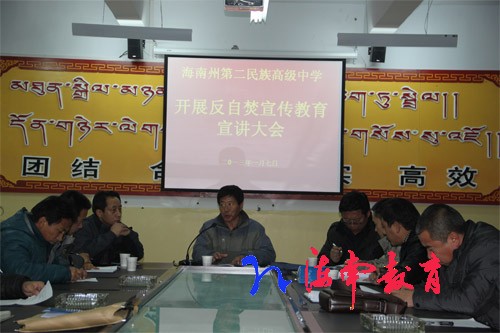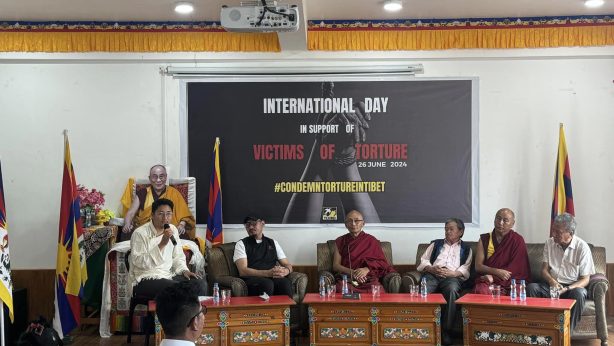China calls for bilingual policy, crackdown on immolations
A special team of Chinese officials recently visited four different schools in Tsolho (Ch: Hainan) Tibetan Autonomous Prefecture, Qinghai Province, to carry out propaganda activity on “anti-immolation special struggle” including campaigns to “instill respect for constitutional provisions on bilingual education policy”, an official Chinese daily reported.[i]
The propaganda campaign was aimed at snuffing out self-immolation protests and shoring up compliance for the controversial bilingual education policy. According to the report, cadres and work teams from Provincial Education Committee and Provincial Department of Education visited Tsolho from 6 to 7 January to implement anti-immolation campaign and guiding the masses on bilingual education policy.
The campaign also focused on the theme “cherish life, abide by law”[ii] and the special “anti-immolation” work teams held meetings where over 250 teachers and student representatives attended the propaganda lectures. At the meetings, the work team members asked teachers and students to “resolutely fight against all hostile forces, further strengthening propaganda and education learning activities against the “three evils, the top three or four love, and consciously safeguard national unity and social stability”.
Professor Niang Wu Jia of Police Academy was one of the propaganda officials running the campaign. At Hainan No. 2 High School,

he lectured the students on the theme of the campaign: “three evils” and “cherishing threes” and “four loves”. He said education and propaganda on anti-self-immolation and good results of bilingual education should be emphasised and the nation’s law and regulations should be followed. Niang also called for “in-depth” efforts in “exposing and criticising the behaviour of self-immolation anti-religious, anti-humanity, the nature of the anti-social.”
Ignoring popular resentment against bilingual policy, Chinese government enforced the new law. Moreover, China’s Constitution emphasises “duty” of the citizens to receive education before the “right” to receive education. Article 46 states, “Citizens of the People’s Republic of China have the duty as well as the right to receive education. The state promotes the all-round moral, intellectual and physical development of children and young people.”
Although article 4 of the Chinese Constitution states that “people of all nationalities have the freedom to use and develop their own spoken and written languages, and to preserve or reform their own ways and customs”, article 19 outlines the state’s role in the development of “socialist educational undertakings”, as the Constitution further proclaims that “The state promotes the nationwide use of Putonghua (common speech based on Beijing pronunciation).”
In Tibetan areas in Qinghai where the medium of instruction is Mandarin, a student needs a mere five per cent in Tibetan but 60 per cent in Mandarin to graduate to higher classes.[iii] That is to say, Mandarin Chinese, as the primary language of instruction, becomes the language that determines academic and professional success.
Bilingual education policy has sparked popular protests particularly those led by middle and high school students in Tibet. In 2010, hundred of Tibetans in Rebkong (Ch: Tongren) rose up in protest against the implementation of the so-called two-language policy. In many of the protests involving young people, Tibetans have called for “language rights” or “language freedom”.
The new language policy although trumpreted as accommodating of two languages, on implementation and in law, it has favored the superiority and primacy of Chinese language, particularly Mandarin.
On 29 October 2010, following the protest in Rebkong, the Qinghai government responded that “as the state is promoting Standard Mandarin and Commonly Used Characters, the rights of using local minority languages by minority peoples is fully respected and guaranteed”.
Last year, protests calling for language rights broke out in Malho Prefecture and Rebkong County.[iv] Major student protests erupted in November last year in Chabcha (Ch: Gonghe) town of Serchen County in Tsolho Prefecture. The protests were sparked by a government-issued booklet that contained vilification of the Dalai Lama and propaganda spiel on the benefits of bilingual education policy.[v]


